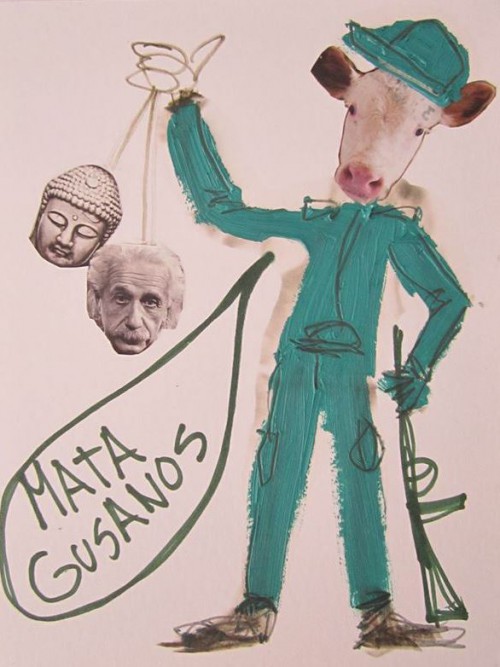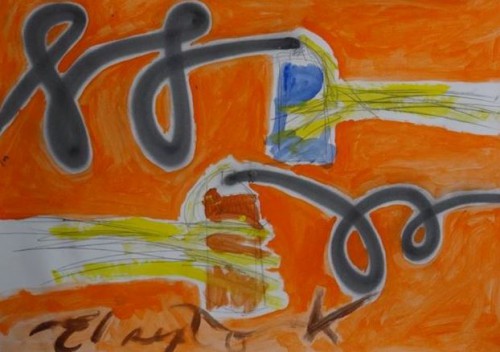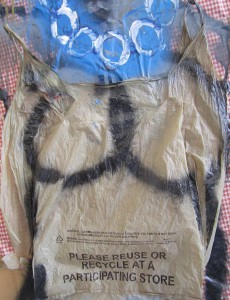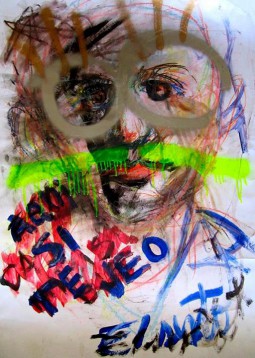17 Abstracts of a Notebook’s Entries by Polina Martínez Shviétsova
by Sampsonia Way / August 30, 2013 / No comments
Translated by David Iaconangelo
1.
Double-nationality hybridity. Survivors without context or ontology. Tepid waters between the fire of being and the ice of nothingness. Poetry’s infinite foam in the middle of the desert. Pamyla, protagonist.
2.
I’m riding in an old American truck and I wonder, “What will I feel after I make love?”
We’re headed toward central Hershey. Not the one in Pennsylvania, but rather the twin brother built here, the Camilo Cienfuegos. I’m carrying my notebook along with my backpack-home, which today doesn’t weigh so heavily. I’m granting myself a day to think less and try to be a normal person. Though I can’t help but wonder, “What will I feel after I make love?”
- Polina Martínez Shviétsova
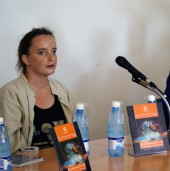
- Polina is a Fiction writer, poet, visual arts performer, and free-lance journalist who has published three books of poetry in Cuba: Gotas de fuego (2004) and Tao del azar (2005) with Unicornio editorial house, as well as the narrative volume Hechos con Metallica (2008).
- She has participated in a research panel on “Russian literature in Cuban culture” (2010) and is also a columnist for CubaEncuentro, Diario de Cuba, and CubaNet.
- She resides in Havana, Cuba.
- Read more…
3.
I’m riding in an old Russian truck and I don’t wonder anything anymore.
All around me, the great patriotic march of June 13: The people cry out in support of a constitutional reform. The pain is plain and honest. The isolation, the poetry of my little fantastic tales which I try to work out but can’t tell right, the delirium: All of it put down in this notebook, pale testimony to the adventures of a Slavic girl on an island of frozen fire, where I gather up the remains of its dead nature with bovine mushrooms.
The world tastes like recycled plastic and I’m a fried patty of sun, cruxified on the purity which leads to forgetting, annunciation of death. It can’t be easy to shout about virtues when the pot keeps turning the soya mince into steam. And without any money. None. Not a damn cent. Where did I put my shawl with Arabic scrawling soaked in Eau de Cannabis?
I believe it was Cortázar who spoke of a “poetics of sponges and chameleons.” I put that down. Sponge: Figure of minute and fragmentary porosity, of an interstitial nature. Chameleon: Figure of confusion, caosmos, and otherness dating back to unknown ages. Of a medieval nature.
4.
“Hey, Vlady! Finally catching you awake.”
“Stop fussing around and get in, Pamyla.”
A cassette of Slavic music: Zolotoe koltso. And everything was in a wonderful heap, circles of gold and clouds of green pyramidal smoke.
“Hey, weren’t you saying you didn’t like the name Brandy as a person in my stories? Well, I’m thinking I’ll change it up for Whiskey instead, how’s that?”
“Nah, homie, I can’t get down with Whiskey either. Make me Vodka, it’s stronger and not so hard on the pieschien.”
“You sure about that? Whiskey’s the best.”
“Shit, you can get vodka up to 99 proof. In Russia the peasants used to make it out of rotten potatoes, and they’d get loaded off of it to pick faster and ferment more of it again.”
“Da, da. They drink to eat and eat to drink. Alright, Vlady, I got you. I’ll make you Vodka in all the stories I’m going to write.”
“You should make me Stepan Razin, the rebel, instead. Or the soldier Suvorov. Or general Kutuzov. Or Vlasov. Homie, what you know about any of them?
5.
“Hey, you all are halfies?”
I address the group timidly, but with light-hearted defiance. We’re in Tarará, where the Ukrainian Embassy has organized a buffet. One of them turns 180 degrees and quips:
“And who the bliat are you?”
“I’m me, Pamyla Shvietsova. Ask your mother about me. And you?”
But the ambassador has already picked the microphone back up and is urging us to pray and toast.
Afterward we fill our plates with delicious imported sandwiches. I also serve myself a cuba libre while I return the gaze of everyone eating and drinking in the group around me, my attacker included.
At the end, they repeated from start to finish the national anthems of both countries before a voice we all recognized sounded through the speakers:
…naplisya ya pianiym, tepier ya pianim ne doido ya… do doma napilsya ya… piamiyn tepier… ne doidu ya do doma…
It went on like that until midnight. The lost songs of Vladimir Vysotsky, Viktor Tsoi, and even the Town Musicians of Bremen. All of it brilliant and surreal as could be.
“You’re my psychopath matryoshka, you’re my psychopath matryoshka,” the guy who attacked me keeps repeating, inexplicably.
We got to be great friends later. Almost lovers. Later, great enemies. Almost lovers, too.
“Little Snow Bear,” I called him in both cases, because his name ended up being Misha.
It’s the “Slavic soul,” I guess. I scribble that down in my notebook, in forgotten Cyrillic characters.
6.
Everyone watches me fall into an unexpected trance. I howl with laughter. My hands are sweating and so is the rest of my body. I feel like wriggling out of my clothes, my memory and my feelings.
I sense a new germ of something, a surge of something unreal, an ecstasy. I must write everything down at once. Someone dictates it to me from the very back of my head:
“I see a painting where the components are: Pamyla, me + Caluff, the Lebanese + Pasha, the Russian. The painting acquires a virtual dimension and, more than color, I sense the magnitude of what’s occurring to us. Me, trapped between them. Naked. I’m in the habit of stripping down wherever. The naked Lebanese presses forward with all his weight over my face, my neck, down to my breasts. He absorbs them and draws with his tongue the figure I imagine in them. He scratches my skin with fingers like obscene tiger claws, while I scream and his braid penetrates into my shell. I see the sleep slipping from his eyes like a gust of spirit. Behind me is Pasha, with his fleshy-lipped mouth, tongue-kissing the back of my neck, my shoulders and the whole length of my back. The refinement of his manhood mingles with a touch of roughness. A moan slips from me and he drives his braid into my darkest rose, wet between my two mountains of snow-white flesh. I moan as their two braids work into my voluptuous body like serpents of smoke, the paths they forge in me are unique. The milk and honey they gush perfumes me. The night’s echo is incense letting off a fog of seaweed. Only we are love made into a universe within life, in body and soul. I award them a kind of violet thunderclap, the crash of snow and desert: it’s like a veil, mist or vapor…
Then they hold me, in a hopeless gesture that can’t be emptied of nostalgia. That’s why I look for magic in the twilight, in any other place I can. “Life is elsewhere,” I think—the metaphor that isn’t Kundera’s—and I jot it down. I also write down, “the poetic memory of the loved one.” And then I write gratefully for letting me clear up the meaning of my last doubt.
Over the speakers, Moonspell penetrates me with a “Tenebrarum Oratorium” from his “Erotic Compemdyum.”
In the dictionary, the word “erotic” doesn’t have an etymology, its only significhaos: A flute made of an exile’s tibia whose notes wield their weeping in silence; a dance through space playing a skin drum of freedom; resurrection’s sonorous synonym.
“Pamy, you alright? Your pressure go down yet?” one says to me from the blank page.
It’s one of my inventions, though I can’t make out which.
7.
Pamyla, a thawout. Cross section of those innards called the soul. Lobotomy. Opening holes in characters. Slicing out random moments, exploits, solitary rooms on this side of the ocean, and the bitter taste of countries and their smells: Question-less answers and not vice versa. An endlessness. An ending of colors rung out by talking heads, masters and messiahs who never accepted its gory reality.
8.
“I was going to make a sketch of God but the ink got thrown out,” I say to myself as I weep in the darkness, and I’m not dancing.
I’m blind, like Björk. And I’m missing a lead zeppelin’s hoarse voice of Led Zeppelin in “Since I’ve Been Loving You.” And I’m missing Igor. So I remember him from a distance. He was a winged kniaz, with a bicycle and a guitar, a Bremen musician trapped beneath an endless sun.
- The Writer Speaks
- Interview by Orlando Luis Pardo Lazo
- “In 2010, I had the strange feeling of fighting against windmills and, finally, in June 2012 I gave up my plans of working with the Cuban-Russians within the island. I felt that everything was falling in a black hole, because of the deaf ears and the apathy of our national bureaucracy.
-
”
He would always come with his levity, his Dante Aligieri-style profile, the Son of God in his eyes, one of Lermontov’s angels. Igor broke off from the Real. A little hawk impossible not to adore. The opposite of beauty isn’t ugliness. The dictionary is a useless weapon when it comes to writing. Choosing a shit-less beauty is like playing in a world of kitsch, practically an instrument for vociferating to the masses. But vociferate what? Only ugliness born of the soul and turned into creation must be authentic. Only Igor is.
“Not all in Heaven have I hated; not everything on earth have I despised.” Pushkin’s pronouncement is like the announcing of Igor’s tragic destiny.
The promise broken like a pane of glass. The discovery of an enormous knife with a medieval hilt, to put to the test the very heart of our dedication. My panic, and his terrible and sudden resolution, evaporating amid the pot being inhaled and a 1972 plastic disk ‒“Since I’ve Been Loving You”—my voice hoarse as that of the girl then named Robert Plant and now Björk. An era whose time was exhausted for us in a single chord.
“I was going to throw out the ink and ended up with God,” I tell myself, dry-faced in the darkness, and now I am dancing.
9.
“Zionist, murderer, criminal, dumbass, pridurka: You really botched things up, you really dropped the ball!” Fedia said in the dream, grabbing me by the neck.
“Where’d you learn to call people things like that?” was the only thing that occurred to me to say.
I woke up, and even a long time later it was as if Fedia hadn’t died. As if her body wasn’t still dangling from the noose, a watch without hands or time.
- David Iaconangelo
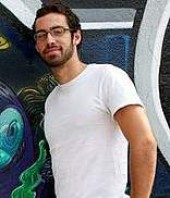
- David Iaconangelo is a writer, translator and journalist based in New York City. His fictions, translations and reviews have been published in Baltimore City Paper, Words Without Borders, and the Caribbean Review of Books, among others. He covers immigration at the Latin Times. He is the former editor of ZafraLit.
10.
“Man, if Dostoevsky was here,” Dima says, laughing in my face, “humanity would be lost.”
“Even more lost?” I say soberly.
“And that’s no two-kopek Russian drama. Not one of these remakes of Tarkovsky done by the ICAIC. Not the Stanislavsky method applied to national folklore. Not Mayakovsky’s dead body with its bloodstained CCCP passport. Not Trotsky’s death as told by Sudoplatov. Not the Kremlin towers felled by an American Airlines Boeing 9/11.”
“So,” I retort, irritated, “what the fuck is…?”
Dima just stays quiet. He’s pure theory, he never has his feet on the zemlya: At times he reminds me of Fedia’s final dance.
11.
Idea I: In a public bathroom, the “cold, turbid and gentle” waters lap at our knees.
Idea II: The contaminated waters where condoms and lumps of shit float, with traces of blood and black clots like loaves of bread.
Idea III: A piece of bread open like a heart in the midst of an attack, the map of every Russia clipped short inside and eaten by an ant-lion named Piotr.
12.
Sleeping at the foot of the oil lamp again. It’s my magic helper, as Fromm might’ve put it. Once again the simultaneity makes me feel like a volley ball in a pre-Olympic game between Cuba and the USSR, with the Atlantic Ocean and the whole twentieth century lost in the nets. Once again the perpetual discontinuous line, telling me that on the cover of my first and only book, Skizein, Pushkin will sit between John Lenin and Vladimir Ilich Lennon in the park on 15th and 6th, with the worst pajmelia of his life and still shooting off about art, philosophy, and civil society. Once again I’m sleepless at the foot of the oil lamp, writing everything down just in case.
13.
Listening with headphones to the band Antiloop, the great-grandchildren of Moby Dick: I’m tired and starving. Gone. My eyes wander amid the crowd and meet Ilya’s gaze. She realizes I’m in a state of coma and wraps me up between arms made of birch wood, a smile flowering on her face as if we didn’t actually hate each other.
She tells me that I was part of a crazy déjà-vu moment of hers. She saw me just then like a serpent or something amphibious or nostalgic. Then she shows me a photo of Anna, the writer who dedicated one of her books to me with: “I will barge into your soul without a name tag.”
I don’t understand the full meaning of the scene: Antiloop, Herman Melville, Ilya, the birch trees, Anna, is it possible to be born again, but for the first time? How not to always have to be returning, without first having procured passage? Among those who haven’t yet been born, who will know how to read me?
14.
At the movies they’re showing Good-Bye, Lenin, a German film. From the seats, we hear Misha the Bear shouting himself hoarse. He might as well be in Moscow Olympic Stadium. He’s ecstatic, for some reason. The usherette shines her flashlight on him and threatens to expel him.
Misha curses her in Russian and, also in Russian, threatens to burn down that fucking theater if he’s not left alone.
“Mir, mir, mir, mir, mir, mir, mir,” he repeats in a falsetto.
The usherette smiles and heads off. She’s letting him rest in mir: she must think he’s just a little bastard. Misha keeps quiet now, with Lenin’s head flying in a helicopter from Berlin to the short-sighted lenses of his glasses. He makes faces. No one in the group notices, but I know he’s acting ecstatic so as not to break down in tears.
“Good-bye, Misha,” I wrote that night in my notebook.
15.
Idea IV: The mirror watches us and tells us we “look like newlyweds all naked like this.” The mirror refracts our image. It shouts at us like Moses at the Jews, “We can’t hear you, because He flows down from his pedestal, with his renewed sight, back from death.” As for me, I’m the AuTorah, the authority who wrote The Old Testament and afterward three times denounced it.
Idea V: A crow flies, denying us the essence written in the Tablets of Stone. It crushes us with falling meprobamates, from which hang our destiny like a desert: Motionless, errant landlessness. There’s a strict cat sleeping on my roof. I circle back to the flames of infancy and I’m a disciple of Freud, Lacan, Deleuze, alternated with Pasha, Igor, Dima, Vlady, and the Lebanese.
Idea VI: I gather up my horseshoe-less steeds. The horses stamp on the winter vases of the Ermitage. It’s the blood on which I feed the ghetto where the breeze or brume or crack of dreams of a gothic intellectuality lives. The Aurora Cruiser fires cannon shots at nine at night. Sofia’s tomb lies in an apocryphal cellar in the Cathedral of Havana. My insides get worn out with the sacred torture. Now I prepare myself and kiss the cross of rustic wood. It’s a bad day for whoever’s just a word in the desert and the lashes pierce the abyss. The blank paper fits in my lungs and there’s no first reason to begin to narrate. I say nothing.
16.
I’m riding in an old Cuban truck and the driver asks, without looking at me, “Why don’t you touch it? If you touch it for me, I’ll give you a hundred rubles.”
He drives with one hand, his left. With the right he shows me his dick. It’s broad daylight and we’re going down Calle 26. When we reach Zapata, we turn off. The cemetery passes us on the other side of the windows. Farther down, the modern, inhabited buildings and the pyramidal monolith of the Plaza. It’s like a movie. I assume it is.
The driver’s phallus recalls the 180 meters of chimney of a thermoelectric plant to the north of Havana, rising up like a flagless pole, facing the sea. The guy has an ugly penis, just like him. But together they’re beautiful.
I don’t respond. He doesn’t insist. We approach a stoplight and I see him cover himself with his shirt. He leans toward me. I let him. He whispers something in my ear and extends his card of introduction.
I read it quickly. It’s from Sovexportfilm, a fake business. No doubt about it, we live in a Russian movie. Whether it’s a story of war or love, I don’t know. Either way, at the light I shoot out the door without saying goodbye.
At the end, the son of the bitch seemed to me like a poor guy. In the end, if he really would have paid me, between the shame and disgust, I might’ve been able to touch it for him.
17.
Drunkenness of non-nationality. Sur-die-ors of the hyperlink and ideology. Social-ipsists rowing on an iceberg which resembles a caiman. Volcanic waters or cesspools seeking to regurgitate themselves into the sea. Short-circuit or voltaic spark between two chromosomes in black and white. The soul of a slave, the soul of a libertine: Steppenwolf. Cutup of images. Flea market of images. Hour zero of narration. The insipid and painless of any double country: Question-less answers and not vice versa. 17 out-of-focus snapshots. 17 abstracts of an agenda. 17 springtimes broken from the single blow of a hurled stone and no shard ever called Pamyla: The agony of a protagonist. Curtain…
Glossary
Zolotoe koltso: Gold ring
Pieschien: Liver
Naplisya ya pianiym, tepier ya pianim ne doido ya… do doma napilsya ya… piamiyn tepier… ne doidu ya do doma: I’ve drunk enough now, now I’m really drunk, now I won’t make it home…
Pridurka: Moron, idiot
Kopeks: Cents
Pajmelia: Hangover
Edited in English by Joshua Barnes
__________
All facts and characters appearing in this work are fictitious. Any resemblance to real persons, living or dead, is purely coincidental.
Los hechos y/o personajes de esta historia son ficticios, cualquier semejanza con la realidad es pura coincidencia.
Leer en español
__________

